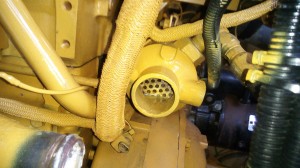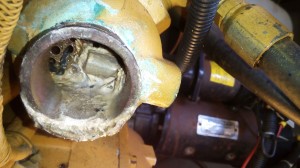Marine engines overheating problems
- by Rares Badrea
-
in Blog
-
Hits: 4748

Have you noticed recently that the engine temperature gauge is reading a little higher than normal? That is probably because your cooling system needs attention. An engine does not have to overheat in order to be a problem, when an overheat occurs it is usually too late for proactive actions and good money must be spend to fix the issue. Let me explain what an increase of only 5 degrees in temperature means because although it might not seem much for it makes a great deal for your engine: When an engine is designed, a certain tolerances (clearances) between moving parts are calculated in order to allow for heat expansion. Engines are made of metal parts and when heated (by the internal combustion) the parts expand and the clearances become smaller than in cold condition. Somehow we need to cool the engine because if the parts continue to expand beyond acceptable values, the engine might seize. That is why any internal combustion engine has some sort of cooling: air cooling or water cooling in general. When an engine is water cooled, that water also needs to be cooled as well after absorbing the heat from the engine and thus it is circulated trough a heat exchanger. In your car for example, the heat exchanger is the radiator.
The radiator is and air-to-water heat exchanger because air is used to cool the water inside. In your boat you have an water-to-water heat exchanger where raw water is used to cool the closed cooling system filled with antifreeze. When the raw water side of your heat exchanger (and also oil cooler, after cooler, fuel cooler) starts to clog because of lime and salt build up, your heat exchanger is loosing its capacity to cool properly and you experience raises in temperature by few degrees. You need to have your cooling system checked once a year, normally during scheduled maintenance, and if any lime build up is observed action needs to be taken before you have increases in temperature that will cause more wear on the engine (more friction due to expanding parts) and more fuel consumption (because of increased friction and load to the engine) to say the least. The best way to clean your cooling system is by using a chemical (usually a mild diluted acid) because this is the only way your whole system is cleaned. A more common practice and far more profitable for the repair shops is to dismantle your cooling system components (heat exchanger, after cooler, fuel cooler, oil cooler, etc) and send them away to be (again) acid dipped and then reassemble them. That is a very expensive exercise that only cleans some parts of your system but not all (you still have hoses, pipes, raw water pump, sea water intake).


Check your operating manual for the specific engine(s) that you have installed in your boat and if your gauges show higher than normal temperature under normal loads then have your cooling system checked by a specialist. There are various business that provide chemically cleaning services for cooling systems at a fraction of price that you would normally pay to have them pulled apart and cleaned. Happy boating Rares Badrea Senior Marine Engineer
